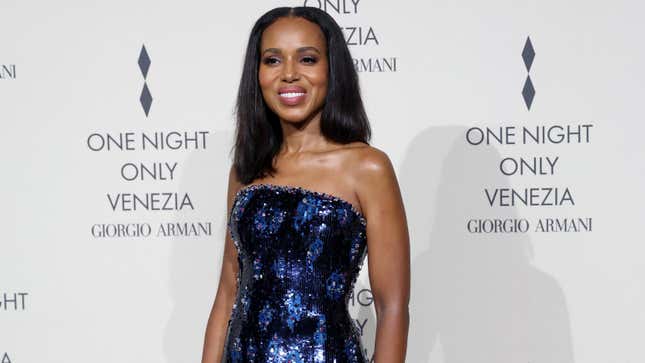
On Tuesday, Kerry Washington released her new memoir, Thicker Than Water. The Scandal and Little Fires Everywhere star opens up about her personal life in the book and shares revelations that has shocked fans. Washington, 47, is a proud Bronx native who has appeared in films like Django Unchained and Ray. Now, she is bearing her soul. Here are the most shocking admissions from Thicker Than Water.
1. She started having panic attacks at age 7.
In her memoir, Washington reveals that she started having panic attacks when she was just 7 years old. She writes that once she was in bed and heard the parents arguing while she was trying to cope with the onset of an attack. Washington ultimately ran to yell at her parents to stop fighting. “I can count on one hand the number of times that I have seen my mother cry. This was the second,” Washington states.
2. Washington partied like an adult in high school.
Washington mentions—but doesn’t go into explicit detail—about her high school days in which she partied like a grown up. There are only a few paragraphs in the book where she describes dating/having sex, drinking alcohol, numerous late nights with friends and going to legendary Manhattan parties like Soul Kitchen.
3. She was intentional about turning down roles where she played the ‘white girl’s best friend.’
In Thicker Than Water, Washington recalls how playing receptionist Renee in the 2004 film Against the Ropes changed the trajectory of her career. “In it, I played [Meg Ryan’s] coworker and confidante – this was becoming a new niche for me, the white girl’s best friend,” she writes. “It’s not that I wanted to be the star of the film; I wanted my characters to be in a story of their own. I didn’t want to be an accessory to a white woman’s journey.”
4. Washington is not related to her biological father and was conceived with a sperm donor.
In 2018, it was revealed to the actress that Washington’s father, Earl, was not her biological father. “Forty-three years ago, we were having a really hard time having a child,” Washington remembers her mother, Valerie, saying. “So we used a surrogate.” The actress was stunned by the news. “I am not who I had been told I was from the beginning of my existence,” Washington writes. “But somehow, the gift of finally knowing the truth outweighed the pain of what that truth was. At that moment, I was liberated by the revelation.”
5. An eating disorder Washington suffered from in college forced her to ask God to help her.
Washington writes that in college she dealt with binge-eating, body obsession and overexercising. “I would—when seeking to stuff my feelings— stuff my face, secretly binge-eating for days at a time, often to the point of physical pain, sometimes to the point of passing out,” she says. “Late at night, all alone, away from home and hiding from all those freshmen, I found myself on my knees, begging for guidance.”
6. Django Unchained originally contained a brutal rape scene but it was ultimately removed from the film.
Washington starred in Quentin Tarantino’s 2012 movie Django Unchained. In “Thicker Than Water,” she shared that she was nervous about a “terrifyingly brutal rape scene” where she “escaped abuse running naked down the street.” However, it was ultimately scrapped from the project. “Jamie and Quentin stood in the corner,” she writes. “Both men were looking down at the dirt floor, and as I walked toward them, Tarantino announced that we were all going home. The scene would be cut from the script...it was the answer to the prayers I had been whispering on my knees.”
7. Washington had an abortion in her 20s.
In her late 20s, Washington made the difficult decision to have an abortion—and a decade later would be the first woman to be shown undergoing an abortion procedure on network television as Scandal’s Olivia Pope. In “Thicker Than Water,” she said the nurse recognized her as a famous actress before the procedure. “She said that I looked like Kerry Washington, that girl from the movies, that girl from the magazines,” she writes. “I only knew that my name belonged to public spaces in a way that made privacy unavailable to me.”

